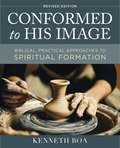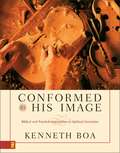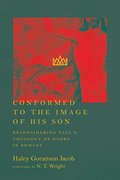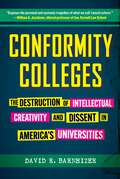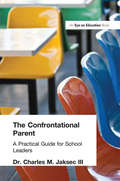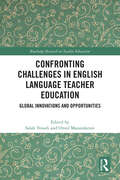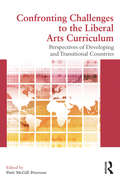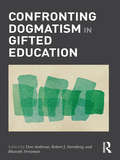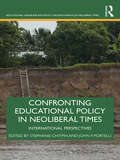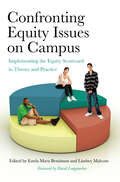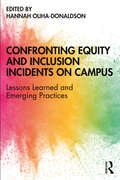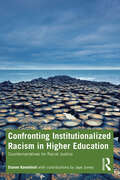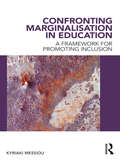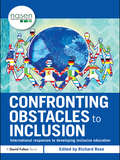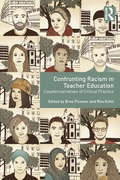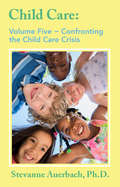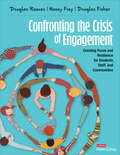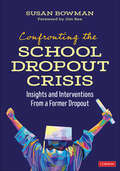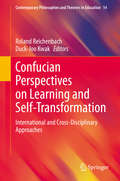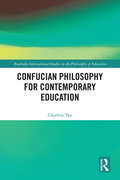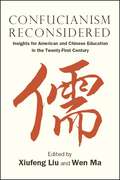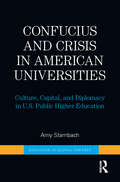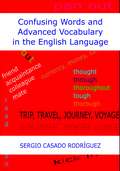- Table View
- List View
Conformed to His Image, Revised Edition: Biblical, Practical Approaches to Spiritual Formation
by Kenneth D. BoaA Comprehensive, Balanced, and Applicable Guide to Spiritual Growth.What does a real relationship with God look like? What does the biblical vision of true spiritual life look like? How do we grow in spiritual maturity? How we answer these questions influence the health, potency, and witness of Christians in an increasingly complex and hostile world.Conformed to His Image answers these questions with clarity and insight, offering a comprehensive, balanced, and applicable guide to spiritual growth. Designed for use in college and seminary courses, this revised edition of the widely used textbook helps readers build their lives on a fully biblical perspective. It offers corrective to our tendency to pick and compartmentalize spiritual growth by exploring twelve facets of authentic Christian spirituality including:Relational Spirituality: Loving God Completely, Ourselves Correctly, and Other CompassionatelyParadigm Spirituality: Cultivating an Eternal versus a Temporal PerspectiveDisciplined Spirituality: Engaging in the Historical DisciplinesExchanged Life Spirituality: Grasping Our True Identity in ChristMotivated Spirituality: A Set of Biblical IncentivesDevotional Spirituality: Falling in Love with GodHolistic Spirituality: Every Component of Life under the Lordship of ChristProcess Spirituality: Process versus Product, Being versus DoingSpirit-Filled Spirituality: Walking in the Power of the SpiritWarfare Spirituality: The World, the Flesh, and the DevilNurturing Spirituality: A Lifestyle of Evangelism and DiscipleshipCorporate Spirituality: Encouragement, Accountability, and WorshipWith chapter overviews and objectives, questions for personal application, a glossary, and a list of key terms, Conformed to His Image provides a defining text for the student, pastor, and church leader of today and tomorrow. This revised edition includes new recommended resources throughout, more recent examples of subjects discussed, and updated wording to better reflect our postmodern context.
Conformed to His Image: Biblical And Practical Approaches To Spiritual Formation
by Kenneth D. BoaWhat does a relationship with God look like and how do we obtain it? It is vital for church leaders to grapple seriously with this question, for pat answers no longer suffice. Lives well-lived, not just words eloquently spoken, must become our response. The quality of our relationship with God is what will influence the health, potency, and witness of the church in an increasingly complex and hostile world. Designed for use as a college or seminary course, Conformed to His Image helps us build our lives on a fully biblical perspective. Exploring twelve approaches to Christian spirituality in depth, Dr. Kenneth Boa corrects our tendency to pick and compartmentalize. Pointing the way instead to an integrative, whole-life approach, Dr. Boa shows how each spiritual paradigm discussed is just one important facet in the gem of authentic and powerful New Testament living. With chapter overviews and objectives, questions for personal application, a glossary, and a list of key terms, Conformed to His Image will prove a defining text for the student, pastor, and church leader of today . . . and tomorrow. 12 Facets of the Complete Christian Life Relational Spirituality: Loving God Completely, Ourselves Correctly, and Others Compassionately Paradigm Spirituality: Cultivating an Eternal versus a Temporal Perspective Disciplined Spirituality: Engaging in the Historical Differences Exchanged Life Spirituality: Grasping Our True Identity in Christ Motivated Spirituality: A Set of Biblical Incentives Devotional Spirituality: Falling in Love with God Holistic Spirituality: Every Component of Life under the Lordship of Christ Process Spirituality: Being versus Doing, Process versus Product Spirit-Filled Spirituality: Walking in the Power of the Spirit Warfare Spirituality: The World, the Flesh, and the Devil Nurturing Spirituality: A Lifestyle of Discipleship and Evangelism Corporate Spirituality: Encouragement, Accountability, and Worship
Conformed to the Image of His Son: Reconsidering Paul's Theology of Glory in Romans
by N. T. Wright Haley Goranson JacobWith its soaring affirmations and profound statements of salvation in Christ, Romans 8 is a high point in Pauline theology. But what does Paul mean when in 8:29 he speaks of being "conformed to the image of his Son"? Remarkably, there has been little scholarly attention awarded to this Pauline statement of the goal of salvation. And yet in Christian piety, preaching, and theology, this is a treasured phrase. Surprisingly, its meaning has been variously and ambiguously expressed. Is it a moral or spiritual or sanctifying conformity to Christ, or to his suffering, or does it point to an eschatological transformation into radiant glory? In Conformed to the Image of His Son, Haley Goranson Jacob probes and reopens a text perhaps too familiar and a meaning too often assumed. If conformity to the image of the Son is the goal of salvation, a proper understanding is paramount. Jacob points out that the key lies in the meaning of "glory" in Paul's biblical-theological perspective and in how he uses the language of glory in Romans. For this investigation of glory alone, her study would be valuable for the fresh understanding she brings to Paul's narrative of glory. But in introducing a new and compelling reading of Romans 8:29, this is a study that makes a strong bid to reorient our understanding of Paul's classic statement of the goal of salvation.
Conformity Colleges: The Destruction of Intellectual Creativity and Dissent in America's Universities
by David R. BarnhizerThe United States' education system, especially its universities, is under attack by the ideological Left, dominated by advocates of Wokeism and Critical Race Theory. Marshall McLuhan was a brilliant thinker best known for his insight that &“the medium is the message." Universities, as well as our entire educational &“medium&” including the K-12 system that feeds its graduates into the university and societal systems, are powerful and overarching mechanisms that we use to shape our understanding. For Western nations, the ideal of the university and of education generally has been to provide us with analytical skills, knowledge, and the ability to create and nurture a healthy society that benefits as many people as possible. That ideal, and the university as educational and social &“medium,&” is under severe attack. The power to use the university as an overarching &“medium&” that offers a strong sense of legitimacy to even flawed and overstated arguments and assertions is why the institution is a target of an ideological Left that is now dominated by advocates of Wokeism and Critical Race Theory. Once obtaining a strong power base in university disciplines and administrations, the revolutionaries of race, gender, and other radical interests metamorphosed from heroic moral beacons fighting and railing against injustice, and revealed themselves as ideological dictators. The truth is that what we now refer to as the Woke/Critical Race Theory activist movement—particularly that controlled by those who came to power in the past thirty years or so—were not simply seeking to expand the nature and content of the university curriculum, or even what is taught in the K-12 system. Their intent was and is to &“destabilize,&” &“transform,&” and supplant what is taught. They seek to create a culture that elevates their interests while aggressively repressing anything they see as an obstacle to power, including healthy discourse and debate. The activists of the Woke/Critical Race Theory Movement are not an honest intellectual movement. They are intense and aggressive political strategists, self-styled &“revolutionaries&” seeking to use our educational systems with the framed narrative of Diversity, Equity, and Inclusion (DEI) that is actually one of "Division, Enmity, and Intimidation/Indoctrination," all the while claiming their interests are benign and aimed at healing. In reality, they are fracturing our fundamental social order, sowing discord, and deliberately suppressing the freedom of speech and thought essential to the well-being of our democratic republic. Conformity Colleges: The Destruction of Intellectual Creativity and Dissent in America&’s Universities will help you understand what is happening and come to grips with the need to challenge, counter, and reverse this &“revolution." Nothing of significance can be done to stop what is going on unless the DEI administrative bureaucracy that now controls universities is dismantled or substantially weakened.
Confrontational Parent, The: Practical Guide for School Leaders
by Charles M. JaksecThis research-based book offers tips and techniques to help school leaders interact successfully with confrontational or aggressive parents.
Confronting Challenges in English Language Teacher Education: Global Innovations and Opportunities (Routledge Research in Teacher Education)
by Salah Troudi Omid MazandaraniThis edited volume presents an inter- and multidisciplinary approach towards language teacher education, confronting the issues that have continued to pervade the field for the last two decades.Featuring contributions from researchers and teacher educators located within a truly international spread of countries – Mexico, Palestine, Tunisia, Cyprus, and Kuwait to name a few – chapters adopt an ecologically glocalised approach to understand how English language teaching is theorised and practised in different educational contexts across the world. Research gathered from interviews, meta-analysis, and international case studies is showcased as chapters consider both pedagogical and online issues within, as well as critical approaches to, language teacher education. Professional development and evaluation programmes across different educational contexts are discussed in-depth along with guidance and insights for the future of the field.The book will be of interest to scholars, researchers, and postgraduate students working in the fields of English language teacher education, TESOL, applied linguistics, continuing professional development.
Confronting Challenges to the Liberal Arts Curriculum: Perspectives of Developing and Transitional Countries
by Patti McGill PetersonComparative research on higher education in developing and transitional countries is often focused on such issues as access, finance, student mobility and the impact of globalization, but there has been little attention to curriculum and the forces that shape it. Confronting Challenges to the Liberal Arts Curriculum fills an important gap in the literature by examining the context, content, challenges, and successes of implementing liberal arts coursework within undergraduate curriculum. In order to fully understand the place of liberal education in each location, chapter authors have employed a wide lens to investigate the influences upon curricular content in China, India, Mexico, Pakistan, Poland, Russia, South Africa, and Turkey. Thus, this volume explores how curricular content is decided, how educational programs are being structured, and whether countries are viewing higher education as more than just the preparation of students for specialized knowledge. By providing detailed case studies of these countries at crucial transition points in their higher education systems, each chapter outlines the state of higher education system and the government’s role, the impact of imported models, the presence of a liberal education, the curricular formation, and best examples of successful programs. Ultimately, this volume depicts how global influences have come to rest in developing countries and how market forces far removed from faculty and students have shaped the undergraduate curriculum. This valuable book is of interest to scholars and researchers in Higher Education as well as practitioners working to foster student and faculty exchange and raise awareness of curricular issues.
Confronting Dogmatism in Gifted Education
by Don Ambrose, Robert J. Sternberg, and Bharath SriramanThis title looks at the dogmatism that limits the perspectives of professionals, policymakers, and other stakeholders in gifted education. In a field where concepts and definitions surrounding high ability have been contested for many years, there is increasing interest in clarifying these notions today. This book offers such clarity, searching outside of the predominant conceptual frameworks that dominate thinking about giftedness and talent, and examining ways in which this conceptual fog stunts and warps the development of gifted minds and limits the effectiveness of curriculum development and instruction. The book directly addresses the connection between dogmatism and high ability, exploring ways in which otherwise bright individuals can make unintelligent decisions. Each contributor in this edited collection connects educational theory with teaching practice, examining the impact of policies such as No Child Left Behind. The chapters also explore the ways in which economic, cultural, and academic contexts affect both the gifted mind and education of the highly able in America and the rest of the world, while making recommendations for positive changes that can be enacted within gifted education in the future.
Confronting Educational Policy in Neoliberal Times: International Perspectives (Educational Leadership and Policy Decision-Making in Neoliberal Times)
by Stephanie Chitpin John P PortelliThis volume explores how educational policy is changing as a result of neoliberal restructuring and how these issues affect educators’ practice. Evidence-based chapters present a sharp analysis of neoliberal education policy while also offering suggestions and recommendations for future action to bring about change consistent with more robust understandings of democracy. Covering issues relating to historical context, philosophical assumptions, policy implementation, accountability, teacher professionalism and standardization, Confronting Educational Policy in Neoliberal Times critically engages the ways micro- and macro- neoliberal politics shapes the purposes and implementation of schooling.
Confronting Equity Issues on Campus: Implementing the Equity Scorecard in Theory and Practice
by Estela Mara Bensimon Lindsey Malcom David LonganeckerHow can it be that 50 years after the passage of the Civil Rights Act, our institutions of higher education have still not found ways of reducing the higher education gaps for racial and ethnic groups? That is the question that informs and animates the Equity Scorecard model of organizational change. It shifts institutions’ focus from what students do (or fail to do) to what institutions can do—through their practices and structures, as well as the actions of their leaders and faculty—to produce equity in outcomes for racially marginalized populations. Drawing on the theory of action research, it creates a structure for practitioners to become investigators of their own institutional culture, to become aware of racial disparities, confront their own practices and learn how things are done on their own turf to ask: In what ways am I contributing to equity/inequity?The Equity Scorecard model differs significantly from traditional approaches to effecting change by creating institutional teams to examine and discuss internal data about student outcomes, disaggregated by race and ethnicity. The premise of the project is that institutional data acts as a powerful trigger for group learning about inequities in educational outcomes, and that the likelihood of improving those outcomes increases if the focus is on those things within the immediate control of the participating leaders and practitioners.Numerous institutions have successfully used The Equity Scorecard’s data tools and processes of self-reflection to uncover and document the behaviors and structures that lead to failure to retain and graduate students from diverse racial and ethnic backgrounds with a history of unequal opportunity; and to create the climate for faculty and staff to take ownership of the issues and develop sustainable practices to eliminate racial disparities in academic performance.The Scorecard can be used at a small-scale to analyze individual courses or programs, as well as broader institutional issues.This book presents the underlying concept of funds of knowledge for race-conscious expertise that informs this process, describes its underlying theories; defines the attributes needed to achieve equity-minded practice; demonstrates, through examples of implementation, what different institutions have learned, and what they have achieved; and provides a blueprint for action for higher education as a whole. For college leaders, instructors and support staff who feel the pressure—moral or otherwise—to close the racial equity gap that their institutions produce year after year, this book provides the structure, knowledge and tools to do so. It is also of value to scholars and students of higher education who have an interest in the study of organizational change.
Confronting Equity and Inclusion Incidents on Campus: Lessons Learned and Emerging Practices
by Hannah Oliha-DonaldsonThis timely book unpacks critical incidents occurring on college and university campuses across the nation. Featuring the voices of faculty, staff, and students, this edited volume offers an interdisciplinary exploration of contemporary diversity, equity, and inclusion (DEI) challenges at the intersections of race, class, gender, and socioeconomic status, while illuminating lessons learned and promising practices. The narratives in this book articulate contemporary challenges, unpack real events, and explore both failed and successful responses, ultimately shining a spotlight on emerging solutions and opportunities for change. Marrying theory and practice, Confronting Equity and Inclusion Incidents on Campus provides a framework for building more inclusive campuses that embody equity and the values of community. A key resource for professionals, students, and scholars of higher education, this volume provides understanding for fostering educational spaces that cultivate belonging among all members of higher education communities, including those historically underrepresented and marginalized.
Confronting Institutionalized Racism in Higher Education: Counternarratives for Racial Justice
by Dianne Ramdeholl Jaye JonesThis book chronicles the experiences of faculty at predominantly white higher education institutions (PWI) by centering voices of racialized faculty across North America. Drawing on Critical Race Theory and critical, feminist, and auto-ethnographic approaches, the text analyzes those narratives, situating people’s words in a landscape of institutionalized racism within higher education. In order to support newer under-represented faculty, administrators committed to supporting faculty, and doctoral students interested in a future in higher education, the book offers strategies and implications for institutional reform and anti-racist faculty organizing/survival in academia. Despite claims by university administrations about commitments to diversity, this book demonstrates otherwise, offering counter-narratives from racialized faculty members who share their struggles.
Confronting Marginalisation in Education: A Framework for Promoting Inclusion
by Kyriaki MessiouOne of the key challenges facing schools today is that of reducing marginalisation amongst pupils in educational contexts. This timely book provides guidance and illustrative examples of the ways in which primary and secondary schools can include all of their students in the academic and social experiences they provide. Developed around a framework
Confronting Obstacles to Inclusion: International Responses to Developing Inclusive Education (nasen spotlight)
by Richard RoseConfronting Obstacles to Inclusion uniquely and comprehensively addresses interpretations of inclusive education by drawing upon the experiences and expertise of leading writers and academics who have direct experience of teaching and researching this area around the world. This landmark publication combines theoretical chapters with practical material demonstrating how the theories can be put in to action in the classroom. The contributors, who all have regular contact with pupils and teachers in inclusive settings, provide a broad spectrum of ideas, examine a number of key themes and interpret these in an international context, such as: the causes of exclusion, the obstacles to inclusion and how these can be overcome supporting families how we can learn from students professional development enhancing teaching and learning support in the classroom. This authoritative text will be of immense interest and use to practitioners, policy-makers, researchers and campaigners who are working towards a more equitable and inclusive society. Through a synthesis of theory and practice the book offers readers an opportunity to explore local, national and international perspectives and raises questions with regards to our current understanding of inclusion. Whilst the interrogation of the concept of inclusion is, in itself important, the book provides examples of professional approaches to the key questions which are currently challenging the education of a diverse range of learners.
Confronting Racism in Teacher Education: Counternarratives of Critical Practice
by Bree Picower Rita KohliConfronting Racism in Teacher Education aims to transform systematic and persistent racism through in-depth analyses of racial justice struggles and strategies in teacher education. By bringing together counternarratives of critical teacher educators, the editors of this volume present key insights from both individual and collective experiences of advancing racial justice. Written for teacher educators, higher education administrators, policy makers, and others concerned with issues of race, the book is comprised of four parts that each represent a distinct perspective on the struggle for racial justice: contributors reflect on their experiences working as educators of Color to transform the culture of predominately White institutions, navigating the challenges of whiteness within teacher education, building transformational bridges within classrooms, and training current and inservice teachers through concrete models of racial justice. By bringing together these often individualized experiences, Confronting Racism in Teacher Education reveals larger patterns that emerge of institutional racism in teacher education, and the strategies that can inspire resistance.
Confronting the Child Care Crisis
by James A Rivaldo Ph.D. Stevanne Auerbach Ph.D. Edward ZieglerConfronting the Child Care Crisis is an outstanding, historically important analysis of childcare dynamics and a practical guidebook for change is essential reading about unmet needs of childcare. Based on years of personal, professional experience, facts and problems show how inadequate childcare significantly contributes to a national dilemma of increased family stress. Recounting experiences in the federal government, Dr. Auerbach reveals red-tape, overlapping services, mismanagement, wasted resources, and how lack of interest and consistent political support stalled critically important legislation, hampering vital programs that could make a huge difference. Dr. Auerbach shows how childcare leaders can respond to improve services at federal, state and local levels, suggesting ways to build bridges of cooperation between government, industry, and local resources to make important changes and improvements. This book includes President Richard Nixon's 1971 veto message after the bi-partisan approved and endorsed childcare legislation (Title V Child Development Programs of S 2007-Economic Opportunity Amendment). Full statements are included from Senators Walter Mondale and Alan Cranston plus The National Plan of Action presented by the National Women's Conference, held in November, 1977.
Confronting the Crisis of Engagement: Creating Focus and Resilience for Students, Staff, and Communities
by Douglas Fisher Nancy Frey Douglas B. ReevesStop apathy in its tracks with the 5 C’s of engagement Disengagement, disenchantment, distress—the three "D’s" of many post-pandemic schools. If we are to find our way back from this brink, every student, teacher, and leader must relearn how to lean in. It’s time to focus, know one another, and stop chasing so many initiatives. It’s time to shake things up so learners want to participate. From faculty meetings to student conferences, casual greetings to grading, you can learn to use practices that most powerfully reflect the Five C’s of Engagement: Connections — feeling known, valued, and tethered to others Conditions — being able to learn in a stable environment in which expectations are high Challenge — engaging in an endeavor knowing your "high jumps" in terms of intellectual and creative risks will be supported Control — the privilege of learning with a balance between ownership and support Collaboration — deepening one’s knowledge and identity as a learner by being skillful at relationship-building Our students are looking to us as the grownups in the room to model what it looks like to belong, believe, and balance high expectations with compassionate support. With Confronting the Crisis of Engagement in hand, you have the guide to make that happen.
Confronting the Crisis of Engagement: Creating Focus and Resilience for Students, Staff, and Communities
by Douglas Fisher Nancy Frey Douglas B. ReevesStop apathy in its tracks with the 5 C’s of engagement Disengagement, disenchantment, distress—the three "D’s" of many post-pandemic schools. If we are to find our way back from this brink, every student, teacher, and leader must relearn how to lean in. It’s time to focus, know one another, and stop chasing so many initiatives. It’s time to shake things up so learners want to participate. From faculty meetings to student conferences, casual greetings to grading, you can learn to use practices that most powerfully reflect the Five C’s of Engagement: Connections — feeling known, valued, and tethered to others Conditions — being able to learn in a stable environment in which expectations are high Challenge — engaging in an endeavor knowing your "high jumps" in terms of intellectual and creative risks will be supported Control — the privilege of learning with a balance between ownership and support Collaboration — deepening one’s knowledge and identity as a learner by being skillful at relationship-building Our students are looking to us as the grownups in the room to model what it looks like to belong, believe, and balance high expectations with compassionate support. With Confronting the Crisis of Engagement in hand, you have the guide to make that happen.
Confronting the School Dropout Crisis: Insights and Interventions From a Former Dropout
by Susan BowmanReach out before they drop out Student dropout rates continue to soar, despite decades of funding, research, programs, and professional development initiatives. This is a wakeup call. Written by a former school dropout, Confronting the School Dropout Crisis encourages educators and related professionals to discover and explore the sometimes unnoticed reasons that youth drop out of school. With fresh strategies for prevention and intervention, this critical resource includes: How to reach and recover students who are at risk of dropping out or who already have Clear, impactful strategies that better engage and positively impact students who are at risk Moving personal stories from teens and the author Confronting the School Dropout Crisis invites you to rethink how you address real dropout issues with young people and how to incorporate fresh approaches to better reach and positively impact these students and their caregivers—before it’s too late.
Confronting the School Dropout Crisis: Insights and Interventions From a Former Dropout
by Susan BowmanReach out before they drop out Student dropout rates continue to soar, despite decades of funding, research, programs, and professional development initiatives. This is a wakeup call. Written by a former school dropout, Confronting the School Dropout Crisis encourages educators and related professionals to discover and explore the sometimes unnoticed reasons that youth drop out of school. With fresh strategies for prevention and intervention, this critical resource includes: How to reach and recover students who are at risk of dropping out or who already have Clear, impactful strategies that better engage and positively impact students who are at risk Moving personal stories from teens and the author Confronting the School Dropout Crisis invites you to rethink how you address real dropout issues with young people and how to incorporate fresh approaches to better reach and positively impact these students and their caregivers—before it’s too late.
Confucian Perspectives on Learning and Self-Transformation: International and Cross-Disciplinary Approaches (Contemporary Philosophies and Theories in Education #14)
by Duck-Joo Kwak Roland ReichenbachThis book bridges the regions of East Asia and the West by offering a detailed and critical inquiry of educational concepts of the East Asian tradition. It provides educational thinkers and practitioners with alternative resources and perspectives for their educational thinking, to enrich their educational languages and to promote the recognition of educational thoughts from different cultures and traditions across a global world.The key notions of Confucian and Neo-Confucian philosophy directly concern the ideals, processes and challenges of learning, education and self-transformation, which can be seen as the western equivalences of liberal education, including the German concept of Bildung. All the topics in the book are of fundamental interest across diverse cultures, giving a voice to a set of long-lasting and yet differentiated cultural traditions of learning and education, and thereby creating a common space for critical philosophical reflection of one's own educational tradition and practice. The book is especially timely, given that the vocabularies in educational discourse today have been dominantly “West centred” for a long time, even while the whole world has become more and more diverse across races, religions and cultures. It offers a great opportunity to philosophers of education for their cross-cultural understanding and self-understanding of educational ideas and practices on both personal and institutional levels.
Confucian Philosophy for Contemporary Education (Routledge International Studies in the Philosophy of Education)
by Charlene TanMost people would not associate Confucian philosophy with contemporary education. After all, the former is an ancient Chinese tradition, and the latter is a modern phenomenon. But this book shows otherwise, by explaining how millennia-old Confucian ideas and practices can inform, inspire and improve school administration, teaching and learning today. Drawing upon major Confucian texts such as the Analects and Mencius , as well as influential thinkers such as Confucius, Zhu Xi and Empress Xu, the various chapters address current educational issues and challenges such as the following: • What roles do schools play in fighting the coronavirus pandemic? • How can humanity resolve the climate emergency? • What (more) should school leaders do to promote education for girls? • Is there more to lifelong learning than just skills upgrading? • What is missing in the existing frameworks on 21st century competencies? • What new initiatives are needed to champion sustainable development? Confucian Philosophy for Contemporary Education answers the above questions and more by presenting a Confucian model of education. The author proposes a Confucian school where Dao – a shared vision of human excellence – is realised through a mindful, learning-centred, action-oriented and ultimately humanising form of education. This book is a useful resource for academic researchers, educators, students and general readers on Confucian philosophy and its continual relevance for present-day education.
Confucianism Reconsidered: Insights for American and Chinese Education in the Twenty-First Century (SUNY series in Asian Studies Development)
by Xiufeng Liu; Wen MaThis is one of the first books to explicitly address twenty-first-century education from a Confucian perspective. The contributors focus on why Confucianism is relevant to both American and Chinese education, how Confucian pedagogical principles can be applied to diverse sociocultural settings, and what the social and moral functions of a Confucianism-based education are. Prominent scholars explore a wide-range of research areas and methods, such as K–12 and college teaching; conceptual comparisons; case studies; and discourse analysis, that reflect the depth and breadth of Confucian ideas, and the divergent contexts in which Confucian principles and practices may be applied. This book not only enriches the research literature on Confucianism from an interdisciplinary perspective, but also offers fresh insights into Confucianism's continuing relevance and its compatibility with the latest research-based pedagogical practices.
Confucius and Crisis in American Universities: Culture, Capital, and Diplomacy in U.S. Public Higher Education (Education in Global Context)
by Amy StambachChina’s investment in U.S. higher education has raised considerable debate, but little research has been directed to the manner in which this investment unfolds and takes shape on the ground in local contexts. Confucius and Crisis in American Universities fills this gap by closely investigating how Chinese-funded U.S. programs are understood and configured in the modern American university. Drawing on interviews with Chinese teachers and their American students, as well as conversations with university administrators, this book argues that Chinese investment in American higher education serves as a broad form of global policy, harnessing the power of intercultural exchange as a means of managing international diplomatic relations through the experiences of university students. A transnational study, Confucius and Crisis in American Universities questions and reframes conventional notions of economic globalization and flexible citizenship, demonstrating how Chinese investment in U.S. education advances the lives of the already-privileged by creating access to overseas labor and markets, but to the exclusion of middle- and working-class students. A valuable and timely resource for scholars of education and anthropology, this book will also be useful to anyone interested in education policy or international affairs.
Confusing Words and Advanced Vocabulary in the English Language
by Sergio Casado Rodríguez Hannah FoxThis ebook is intended for English learners who are hoping to reach an advanced level of the language. It includes explanations of the differences between easily confused words and lists of vocabulary and expressions with respective examples.
